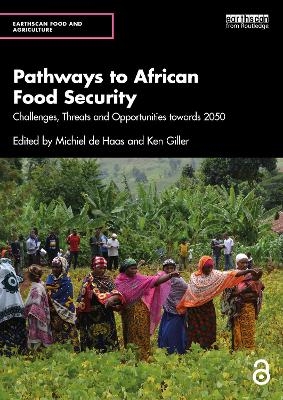
Pathways to African Food Security
Routledge (Verlag)
978-1-032-64965-8 (ISBN)
- Noch nicht erschienen (ca. Januar 2025)
- Versandkostenfrei
- Auch auf Rechnung
- Artikel merken
This book examines Africa’s current food system and future challenges for food security over the next twenty-five years.
Africa is on the rise and by 2050, the continent will be home to a quarter of the world’s population. The analysis presented in this book clearly shows that the African food system needs to transform at a much faster pace to ensure that the people it serves are food secure. The book begins with four contrasting case studies which focus on country-specific challenges in Egypt, Ethiopia, Senegal and Zimbabwe. This is followed by fifteen thematic chapters organised in three sections on challenges, threats and opportunities. Individual chapters address a wide range of topics including climate change, water security, farm sizes, crop yields, conservation trade-offs, food prices, trade, conflict and structural change. The book concludes by discussing key pathways to improve Africa's food system and food security for the decades ahead.
This book is essential reading for students, scholars and practitioners who work on global food security, sustainable food systems, food, health and nutrition and African development.
Michiel de Haas is an Assistant Professor of Economic and Environmental History at Wageningen University and Research, the Netherlands. Ken E. Giller is Emeritus Professor of Plant Production Systems at Wageningen University and Research, the Netherlands.
Introduction 1. Michiel de Haas, Katrien Descheemaeker, Peter Ebanyat, Ewout Frankema, Ken E. Giller, Ibrahima Hathie and Leo van Wissen: Food systems and food security in Africa: looking back and projecting forwards Part 1. Diverse pathways on the country level: past, present and future 2. Ibrahima Hathie: Senegal’s journey to feed its growing population by 2050: towards accelerated food systems transformation 3. Tesfaye Sida, Temesgen Desalegn, Gashaw Tadesse, and Tilahun Amede: Feeding a fast-growing population by 2050 through accelerated agricultural transformation: Potential avenues for Ethiopia 4. Racha Ramadan and Antoine Castet: Past, Present and Future of Food Security in Egypt 5. Mark Nyandoro and Jens A. Andersson: Zimbabwe’s Agriculture and Food Security: Past, Present and Future Perspectives (1960-2050) Part 2. Challenges 6. Leo van Wissen: Africa’s demographic challenge 7. Antonius G.T. Schut & Martin K. van Ittersum: From yield and nutrient gaps to assessing future food self-sufficiency in Africa 8. Siemen van Berkum & Bart de Steenhuijsen Piters: Global market and food security in Africa: more trade or more domestic production? 9. Ewout Frankema: Why is food expensive in sub-Saharan African cities? 10. Alida Melse-Boonstra, Inge D. Brouwer, Folake Samuel, and Mofu Musonda: Addressing malnutrition in all its forms in Africa requires a radical paradigm shift Part 3: Threats 11. Han van Dijk and Nakar Syntyche Djindil: Political Instability and Food Security: The Long View Towards 2050 12. Katrien Descheemaeker, Patricia Masikati & Dilys Sefakor MacCarthy: Climate change: impacts and adaptation in smallholder farming systems in sub-Saharan Africa 13. Marieke Sassen: Reconciling food security and forest conservation in Africa: challenges and opportunities 14. Janneke Pieters: Food security for Africa’s growing population: a labour market perspective 15. Ken E Giller & Jens Andersson: How small is beautiful? Farm size and economic development in Africa Part 4. Opportunities 16. Douglas Sheil: Transformative trees: Forests for water and food security 17. Gert Jan Veldwisch, Jonathan Denison, Gabriella Izzi, Jean Kamwamba-Mtethiwa, Hans Komakech, Banci Mati & Pieter Waalewijn: A water angle on Africa’s 2050 food security challenge 18. Enoch Kikulwe & Justus Wesseler: The Potential of the Bioeconomy for Africa 19. Gerrit-Jan van Uffelen: Africa’s protracted food crises: building food systems resilience improves food and nutrition security 20. Simon J. Oosting, Todd A. Crane, An Notenbaert, Ademola Braimoh, Asaah Ndambi, Augustine Ayantunde, Esther Kihoro, Corina van Middelaar & Jan van der Lee: The multifunctional role of livestock in East African food systems: the case for dairy 21. Paul Ingenbleek, Olawale Rotimi Opeyemi, Dorothy Kanorio Mugane, Cobus Oberholster, and Lucas E. Urbano: Extending the Smallholder Value-Creation Frontier: A Business Perspective on Food Security 22. Erwin Bulte, Niccolò Meriggi, Michael Rozelle and Maarten Voors: Agricultural development in the poorest countries: insights from the poultry sector in Sierra Leone Conclusion 23. Michiel de Haas, Ewout Frankema, and Ken E. Giller: Growing towards a food secure Africa in 2050: Reflections and pathways
| Erscheint lt. Verlag | 31.1.2025 |
|---|---|
| Reihe/Serie | Earthscan Food and Agriculture |
| Zusatzinfo | 13 Tables, black and white; 52 Line drawings, black and white; 1 Halftones, black and white; 53 Illustrations, black and white |
| Verlagsort | London |
| Sprache | englisch |
| Maße | 174 x 246 mm |
| Themenwelt | Naturwissenschaften ► Biologie ► Ökologie / Naturschutz |
| Weitere Fachgebiete ► Land- / Forstwirtschaft / Fischerei | |
| ISBN-10 | 1-032-64965-8 / 1032649658 |
| ISBN-13 | 978-1-032-64965-8 / 9781032649658 |
| Zustand | Neuware |
| Informationen gemäß Produktsicherheitsverordnung (GPSR) | |
| Haben Sie eine Frage zum Produkt? |
aus dem Bereich


